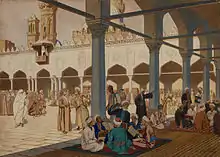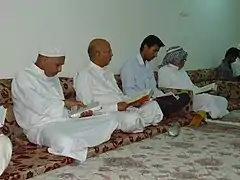| Part of a series on |
| Algerian Islamic reference |
|---|
  |
| Part of a series on Islam Sufism |
|---|
 |
|
|
The Hezzab (Arabic: حَزَّاب) is the hafiz or qāriʾ supervising or participating in the Hizb Rateb in mosques and zawiyas in Algeria according to the Algerian Islamic reference under the supervision of the Ministry of Religious Affairs and Endowments.[1]
History
Mosques in Algeria recruit several hezzabine as salaried employees responsible for reciting the Hizb Rateb on a daily basis, as well as the Salka periodically, under the supervision of a Bash Hezzab.[2][3]
As an example, the Mosque of Sidi Abderrahmane Et-Thaalibi had its employees such as Wakil, Imam and Hezzab among others.[4][5]
Characteristics
The hezzab should be a hafiz of the Quran as a whole, with the narration of Warsh recitation.[6][7]
When accomplishing the Tilawa, the condition of memorizing the entire Quran is due to the fact that it is not suitable and acceptable for him to read from the Mus'haf while he leads the group of readers (Arabic: ناس الحضور) and directing them at the same time.[8]
It is good for him to obtain a Quran Idjaza from an accredited body such as a zawiya or an Islamic institute to prove his merit for the position and religious responsibility.[9]
And he must possess a strong vocal layer that allows him to dominate the voice over the entirety of the qāriʾs during the Hizb Rateb recitation.[10]
This is because the reading stations of the hezzab make its circle attractive, and dozens or even hundreds of worshipers visit the mosque for the daily participation in this collective recitation.[11]
According to the degree of skill, discipline, attractiveness of voice and performance, the hezzab can rise to the rank of Bash Hezzab in the large mosques that contain many hezzabine.[12]
After that, he can be promoted to the rank of a muezzin and then imam, as was done in the past in the Algerian mosques and zawiyas.[13][14]
Gallery
 Hezzabine reading the Hizb Rateb
Hezzabine reading the Hizb Rateb Hezzabine reading the Hizb Rateb
Hezzabine reading the Hizb Rateb.jpg.webp) Hezzabine reading the Hizb Rateb
Hezzabine reading the Hizb Rateb
See also
- Ministry of Religious Affairs and Endowments
- Algerian islamic reference
- Islam in Algeria
- Religion in Algeria
- Muftis in Algiers
- Zawiyas in Algeria
- List of mosques in Algeria
- Djamaa el Djazaïr
- Djamaa el Kebir
- Warsh recitation
- Idjaza
- Hizb Rateb
- Nass al-Houdhour
- Bash Hezzab
- Salka
- Raising hands in Dua
- Tawassul
- Tilawa
- Sujud Tilawa
References
- ↑ "وزارة الشؤون الدينية والأوقاف". www.marw.dz.
- ↑ "ص32 - كتاب تاريخ الجزائر الثقافي - مساجد العاصمة - المكتبة الشاملة الحديثة". al-maktaba.org.
- ↑ Devoulx, Albert (January 6, 1870). "Les édifices religieux de l'ancien Alger". Bastide – via Google Books.
- ↑ بوهند, خالد; السياسات, المركز العربي للأبحاث ودراسة (August 1, 2020). النخب الجزائرية: 1892–1942. المركز العربي للأبحاث ودراسة السياسات. ISBN 9786144453506 – via Google Books.
- ↑ algérienne, Société historique (January 6, 1875). "Revue africaine". La Société – via Google Books.
- ↑ "الجامع ليس للصلاة فقط". جزايرس.
- ↑ "Revue des sociétés savantes des departements". Imprimerie nationale. January 6, 1882 – via Google Books.
- ↑ المختار/السوسي, محمد (January 1, 2015). مدارس سوس العتيقة - نظامها - أساتذتها: و يليه رجالات العلم العربي في سوس من القرن الخامس الهجري الى منتصف القرن الرابع عشر. Dar Al Kotob Al Ilmiyah دار الكتب العلمية. ISBN 9782745100733 – via Google Books.
- ↑ بوهند, خالد; السياسات, المركز العربي للأبحاث ودراسة (August 1, 2020). النخب الجزائرية: 1892–1942. المركز العربي للأبحاث ودراسة السياسات. ISBN 9786144453506 – via Google Books.
- ↑ "ص81 - كتاب تاريخ الجزائر الثقافي - بعض أعيان المدرسين في العاصمة - المكتبة الشاملة الحديثة". al-maktaba.org.
- ↑ بوهند, خالد; السياسات, المركز العربي للأبحاث ودراسة (August 1, 2020). النخب الجزائرية: 1892–1942. المركز العربي للأبحاث ودراسة السياسات. ISBN 9786144453506 – via Google Books.
- ↑ بوهند, خالد; السياسات, المركز العربي للأبحاث ودراسة (August 1, 2020). النخب الجزائرية: 1892–1942. المركز العربي للأبحاث ودراسة السياسات. ISBN 9786144453506 – via Google Books.
- ↑ "ص367 - كتاب تاريخ الجزائر الثقافي - الهيئة الدينية - المكتبة الشاملة الحديثة". al-maktaba.org.
- ↑ "Code de l'Algérie annoté: recueil chronologique des lois, ordonnances, décrets, arrêtés, circulaires, etc., formant la législation algérienne actuellement en vigeur, avec les travaux préparatoires et l'indication de la jurisprudence, suivi d'une table alphabétique de concordance". A. Jourdan. January 6, 1896 – via Google Books.


